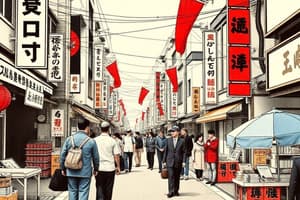Podcast
Questions and Answers
What impact did the Smoot-Hawley Tariff have on Japanese goods?
What impact did the Smoot-Hawley Tariff have on Japanese goods?
What was one major consequence of Japan's invasion of Manchuria?
What was one major consequence of Japan's invasion of Manchuria?
Which industry was severely impacted during the Great Depression in Japan?
Which industry was severely impacted during the Great Depression in Japan?
What geographical area was seen as essential for Japan's growth due to its resources?
What geographical area was seen as essential for Japan's growth due to its resources?
Signup and view all the answers
What was a significant obstacle to Japan's possession of Manchuria?
What was a significant obstacle to Japan's possession of Manchuria?
Signup and view all the answers
What was the reaction of Japan to the condemnation from the western nations after their invasion of Manchuria?
What was the reaction of Japan to the condemnation from the western nations after their invasion of Manchuria?
Signup and view all the answers
What event triggered the escalation of Japanese military action in Manchuria?
What event triggered the escalation of Japanese military action in Manchuria?
Signup and view all the answers
How did Japan perceive western negotiations after the Manchurian Crisis?
How did Japan perceive western negotiations after the Manchurian Crisis?
Signup and view all the answers
What was the status of Manchuria after Japan's military takeover in 1932?
What was the status of Manchuria after Japan's military takeover in 1932?
Signup and view all the answers
What was one of the primary motivations behind Japan's establishment of 'Manchukuo'?
What was one of the primary motivations behind Japan's establishment of 'Manchukuo'?
Signup and view all the answers
How did the Nationalist Party in China initially respond to Japanese aggression?
How did the Nationalist Party in China initially respond to Japanese aggression?
Signup and view all the answers
How did the Chinese populace respond economically to Japan’s actions?
How did the Chinese populace respond economically to Japan’s actions?
Signup and view all the answers
What was a consequence of Japan's continued military aggression in China?
What was a consequence of Japan's continued military aggression in China?
Signup and view all the answers
What was one of the financial impacts of Japan's military actions in China?
What was one of the financial impacts of Japan's military actions in China?
Signup and view all the answers
What ideology did Japan maintain in contrast to Germany and Italy during this period?
What ideology did Japan maintain in contrast to Germany and Italy during this period?
Signup and view all the answers
What was indicated by Japan’s signing of the Anti-Comintern Pact in 1936?
What was indicated by Japan’s signing of the Anti-Comintern Pact in 1936?
Signup and view all the answers
What contributed to Japan's miscalculation regarding Chinese resistance during the Sino-Japanese War?
What contributed to Japan's miscalculation regarding Chinese resistance during the Sino-Japanese War?
Signup and view all the answers
Which event marked the beginning of significant fighting between Japanese and Chinese forces in 1937?
Which event marked the beginning of significant fighting between Japanese and Chinese forces in 1937?
Signup and view all the answers
What was one of the significant consequences for Japan after the Rape of Nanjing?
What was one of the significant consequences for Japan after the Rape of Nanjing?
Signup and view all the answers
What tactic did Japanese forces face more frequently as the war continued?
What tactic did Japanese forces face more frequently as the war continued?
Signup and view all the answers
Who were the primary leaders of Chinese resistance during the Sino-Japanese War?
Who were the primary leaders of Chinese resistance during the Sino-Japanese War?
Signup and view all the answers
What was a result of Japan's lack of industrial resources during the conflict?
What was a result of Japan's lack of industrial resources during the conflict?
Signup and view all the answers
What plans did Japan have for East Asia after declaring itself an imperial power in 1938?
What plans did Japan have for East Asia after declaring itself an imperial power in 1938?
Signup and view all the answers
What major political change occurred in Japan in 1940 during the war?
What major political change occurred in Japan in 1940 during the war?
Signup and view all the answers
Study Notes
Japanese Domestic Issues Before 1932; Economic Crisis
- The Smoot-Hawley Tariff increased tariffs on Japanese goods by 200%.
- The silk industry suffered greatly, with silk prices declining to 1/5th of their 1923 value by 1932.
- Unemployment reached 3 million in Japan.
- Manchuria was viewed as a valuable resource, with its coal, iron, and timber appealing to Japan's needs.
- The Great Depression significantly impacted the entire international economic system, leading to protectionist policies and casts doubt on democracy.
Manchuria
- Japan's invasion of Manchuria began on September 18, 1931.
- The Kwantung Army, a Japanese military branch, initiated the invasion, blaming the Chinese for an explosion on the South Manchurian railway. Evidence suggests the Army was responsible for the explosion.
- The Kwantung Army refused to halt after the Japanese government declared a "non-expansion of hostilities" policy.
- This invasion pushed further into the Manchurian countryside.
- Japanese seizure of Manchuria was seen as a critical resource acquisition for Japan.
- An explosion on the Japanese-owned section of the South Manchurian Railway was the catalyst for the invasion.
- The Kwantung Army claimed the Chinese were responsible for the incident as an excuse to act.
- The Chinese later retreated from Mukden.
Results of the Manchurian Crisis on Japan's International Relations
- Western countries viewed Japan as a deceptive aggressor.
- Japan's actions led to its expulsion from the League of Nations.
- Japan abandoned international cooperation, especially with Western powers.
- Western negotiations were perceived as biased against Japanese expansion.
- The Kwantung army was a branch of the Japanese imperial army, but was unable to receive word from the Emperor to halt their actions. This failure to take order from the Emperor happened after Japan began their invasion of Manchuria.
- Western relations deteriorated as Japan's actions, and use of force, led to Japan being condemned by the League of Nations.
- Japan's actions led to further treaty isolation.
Studying That Suits You
Use AI to generate personalized quizzes and flashcards to suit your learning preferences.
Description
Explore the economic challenges Japan faced before 1932, focusing on the impact of the Smoot-Hawley Tariff and the silk industry decline. Understand the events surrounding Japan's invasion of Manchuria and the implications of this aggression on Japan's international relations. This quiz delves into the interplay of domestic issues and military expansion.




